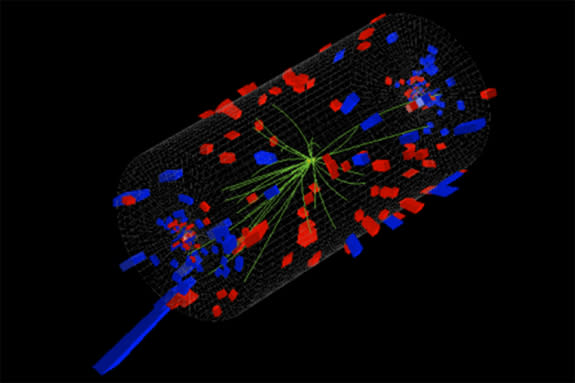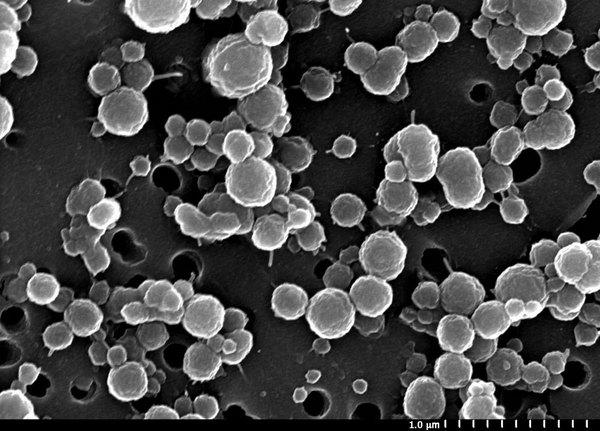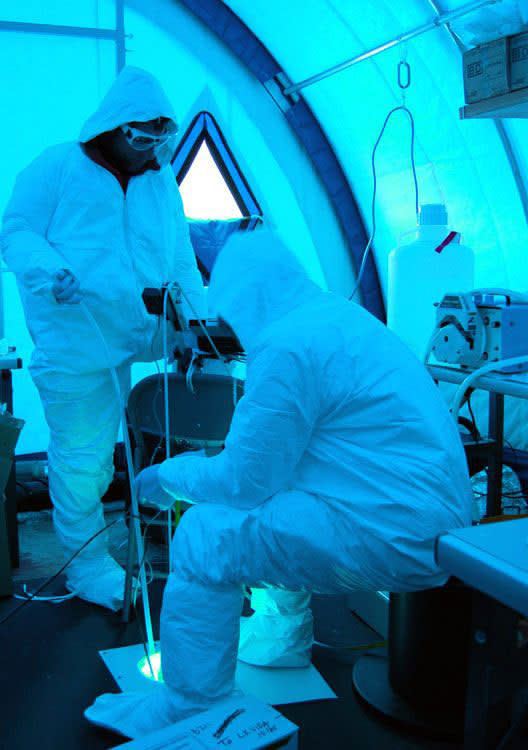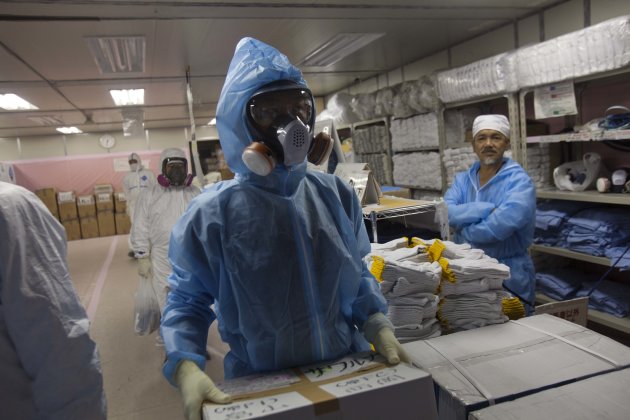They tell therapists they have been harangued by residents displaced in Japan's nuclear disaster and threatened with signs on their doors telling them to leave. Some of their children have been taunted at school, and prospective landlords have turned them away.
"They have become targets of people's anger," Shigemura told The Associated Press.
TEPCO workers — in their readily identifiable blue uniforms — were once considered to be among the elite in this rural area 230 kilometers (140 kilometers) north of Tokyo. But after the March 11, 2011, earthquake and tsunami set off meltdowns at the Fukushima plant, residents came to view them as "perpetrators," Shigemura said.
Many TEPCO families in the area now hide their link to the company for fear of criticism, local doctors and psychiatrists say.
Shigemura likens the workers' experience to that of U.S. Vietnam veterans returning home to hostility in the 1960s and early '70s.
"They both worked for (the good of) their countries, but they got a backlash," he said.
About a dozen nuclear workers approached by the AP declined to be interviewed for this report. Except in rare cases, TEPCO has repeatedly declined requests to interview workers, and the workers themselves have shunned virtually all media attention, so these doctors' accounts provide an unusual glimpse into their lives.
One former TEPCO employee who lived in the town of Tomioka, inside the 20-kilometer (15-mile) exclusion zone around the plant, told journalists during a rare visit to the Fukushima plant in February that she was frequently harassed by evacuees among the 100,000 displaced by the disaster.
"Many people who want to go home are getting frustrated and they often yell at me, 'How are you going to make it up to us?'" said Saori Kanesaki, a former visitor guide at the Fukushima plant.
More than a half-century ago, many Japanese survivors of the U.S. bombings of Hiroshima and Nagasaki were stigmatized due to fears about their exposure to radiation. But the Fukushima disaster has thrown up a completely new kind of discrimination because of the workers' links to TEPCO, a company widely despised throughout Japan for its mishandling of the disaster.
Some 3,000 TEPCO employees and other contractors continue to labor daily at the plant in one of the world's riskiest jobs — keeping three melted-down reactor cores as well as spent fuel pools cool through a makeshift system of water pipes.
They face a long haul: Removing the fuel and completely shutting down the plant could take 40 years.
Worries about radiation exposure aren't overwhelmingly prevalent among the TEPCO workers, both doctors say, although some workers are concerned, especially those with higher exposure counts. During the crisis, authorities raised the maximum radiation exposure limit to 250 millisieverts from 100 millisieverts. Six TEPCO workers surpassed that level, and were removed from work at the plant. That exposure level was lowered again in December to 50 millisieverts, with an exception allowing up to 100 millisieverts in emergencies.
In addition to the discrimination, the TEPCO nuclear workers, who are specially trained, are anxious that they will be transferred to a completely different kind of job, such as clerical work, if they should surpass the exposure limit, the doctors say.
"More than health risk, they are worried about social risk and employment risk," said Takeshi Tanigawa, an epidemiologist with Ehime University's medical school who visited the plant after the disaster and was the one of the first to report its harsh working conditions, which have since improved. He has been back 15 times since, and Shigemura later volunteered to join him.
The two doctors report that they are not aware of any case of radiation sickness or radiation burns among the workers, who undergo regular checks for radiation levels in their bodies.
A brief report on their experience visiting the Fukushima plant soon after the disaster that highlights the discrimination workers faced was published in Wednesday's issue of The American Journal of Psychiatry.
The Japanese public and press, meanwhile, has offered the workers little praise, unlike the Western media, which during the height of the crisis portrayed the remaining band of workers at the plant as the heroic "Fukushima 50." The domestic press instead emphasized how the dangers faced by the workers reflected the risks of nuclear power.
Culture helps explain some of these dynamics, including the strong Japanese sense of duty and group responsibility.
"People believe the workers share in the responsibility" for the disaster even though they didn't cause it, Tanigawa said.
Disaster psychiatry is not well-developed in Japan. The 1995 Kobe earthquake brought growing awareness of the psychological trauma of disasters, but specialists in the field remain rare.
Research from the 1986 Chernobyl nuclear disaster suggests that mental health problems will persist for years.
Eighteen years after that crisis, Chernobyl clean-up workers experienced higher rates of depression, anxiety disorders, post-traumatic stress disorder, headaches and suicidal thoughts than the general population, according to a 2008 study in the journal Psychological Medicine.
Many TEPCO workers now live in a temporary barracks at a soccer stadium called J-Village, several kilometers (miles) south of the Fukushima Dai-ichi plant. Workers at J-Village approached by a journalist refused to talk, and other contractors said they would get in trouble with the utility if they did.
Environment Minister Goshi Hosono, who is also in charge of nuclear crisis management, has made a point of thanking the workers during visits to the Fukushima plant, and children from around Japan have sent drawings and words of encouragement. But the workers have told the doctors that in restricted areas around the plant, former neighbors have shouted, thrown bottles and shoved them during their brief visits home to retrieve belongings.
Such discrimination weighs heavily on the workers, said Shigemura.
"Showing appreciation to the workers is an urgent need. It's totally lacking," Shigemura said, adding that he believes stigmatization is a key factor in influencing the workers' psychological distress.
A growing number of the workers tell the visiting psychiatrists of sagging motivation and hopelessness, and Shigemura warned that such attitudes could lead to "misconduct or human error or sabotage." He also said the workers are drinking more alcohol and smoking more.
His team started to receive some research funding from the Health Ministry in April.
Shigemura predicts that the rate of post-traumatic stress disorder among Fukushima workers 2-3 years after the disaster will surpass the rate among 9/11 rescue and recovery workers, which a 2007 study in The American Journal of Psychiatry said was 12.4 percent.
TEPCO says it is considering hiring a full-time psychiatrist to help meet the mental health needs of workers at the plant, but that there are a shortage of such experts, particularly in the Fukushima region.
"The public's trust in TEPCO has declined, so we will work to improve that," said Yuji Ohya, an official with the company's health and safety department. "Hopefully as that improves, it will boost the workers' spirits." ( Associated Press )





